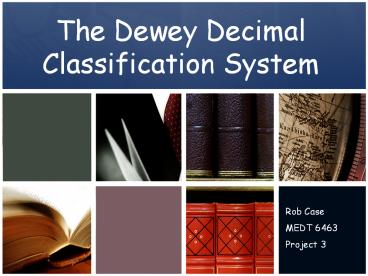The Dewey Decimal Classification System - PowerPoint PPT Presentation
Title:
The Dewey Decimal Classification System
Description:
The Dewey Decimal Classification System Rob Case MEDT 6463 Project 3 – PowerPoint PPT presentation
Number of Views:594
Avg rating:3.0/5.0
Title: The Dewey Decimal Classification System
1
The Dewey Decimal Classification System
Rob Case MEDT 6463 Project 3
2
Why Study the Dewey Decimal System?
- We will look at the Dewey Decimal Classification
System so that you can learn how materials are
organized in your Media Center. - This will make it possible for you find materials
you need for class and for pleasure reading.
3
Who Was Melvil Dewey?
- Melville Louis Kossuth Dewey was born on December
10, 1851 in Adams Center, New York. - Keenly interested in simplified spelling, he
shortened his first name to Melvil as a young
adult and dropped his middle names. For a short
time, even spelled his last name as Dui.
4
Who Was Melvil Dewey? (cont.)
- Dewey invented the Dewey Decimal Classification
(DDC) system when he was 21 and working as a
student assistant in the library of Amherst
College. - Melvil Dewey is known as the Father of Modern
Librarianship. - Dewey founded the first library school.
- Dewey helped establish the American Library
Association (ALA) in 1876, and is credited with
creating the world's first library science
curriculum.
5
Dewey Decimal Classification System
- 000 - General Works
- 100 - Philosophy and Psychology
- 200 - Religion
- 300 - Social Science
- 400 - Language
- 500 - Natural Science and Mathematics
- 600 - Technology (Applied Sciences)
- 700 Arts and Recreation
- 800 - Literature
- 900 - Geography and History
6
General Works 000-099
- Books with many subjects all in one
- These books include Bibliographies,
Encyclopedias, Books of Facts, etc - This section also includes books related to news
media, journalism and publishing as well as
magazines, journals and serials
7
Philosophy and Psychology 100-199
- Books on philosophy, psychology, paranormal,
logic and ethics - Books on feelings, thoughts and ideas
- Books on how to study and other self-improvement
8
Religion 200-299
- Books on all the ideas of religion and natural
theology - Books on the bible and the Christian denomination
- Books on different world religions and what they
believe
9
Social Science 300-399
- Books about sociology, anthropology, economics
and education - Books regarding laws and government
- Also includes books about customs, etiquette and
folklore.
10
Language 400-499
- Books involving language and linguistics
- Books about foreign languages such as Spanish,
French, German, etc - Also includes Thesauri, Dictionaries and books
about English grammar
11
Natural Science and Mathematics 500-599
- Books about science, mathematics, astronomy,
physics and chemistry - Includes books about rocks, animals, insects,
fossils, weather, etc. - These books help us understand our environment
and the world around us
12
Technology (Applied Sciences) 600-699
- Books about technology, medicine and engineering
- Includes books about agriculture, home economics
and chemical engineering - Also includes books on manufacturing and buildings
13
Arts and Recreation 700-799
- Books about art and recreation
- Includes books about painting, photography,
landscaping, and architecture - Also includes books on music and sports
14
Literature 800-899
- Books about literature and rhetoric
- Includes books about poems, plays, short stories,
riddles and jokes - This section features classic works of writing by
William Shakespeare
15
Geography and History 900-999
- Books about geography and history
- Includes books about groups of people, countries,
and war - This section features books about travel and
atlases
16
How does the Dewey Decimal System Work?
- The DDC classifies or categorizes nonfiction
books into ten main divisions which are arranged
from lowest number (000) to highest number (999).
- - 133.5
- - 255.3
- - 333.5
- A book is assigned a Dewey number based on its
subject matter. In most libraries the Dewey
number and the first three letters of the
author's last name become the book's call number.
They are arranged alphabetically if the call
number is the same. - - 133.5 Abc
- - 133.5 Bcd
- - 133.5 Def
17
Dewey Decimal System Review Activities
- Try these online review activities to practice
what you - have just learned
- Do We Really Know Dewey http//library.thinkques
t.org/5002/index.shtml - Quia Matching Game (need Java script to run)
- http//www.quia.com/jg/7265.html
- Library Skills Game http//www.ccsd.edu/bardonia/L
earningGames/LibrarySkills/ - Lets Do Dewey
- http//frank.mtsu.edu/vvesper/dewey2.htm
18
Sources
- Flickr (2006). Melvil Dewey Image. Retrieved
April 2009 from http//www.flickr.com/photos/br
ianbrarian/200420263/ - OCLC (2008). How one library pioneer profoundly
influenced modern librarianship. Retrieved
April 2009 from http//www.oclc.org/dewey/resou
rces/biography/ - OCLC (2008). A Brief Introduction to the Dewey
Decimal Classification. Retrieved April 2009
from http//www.oclc.org/dewey/resources/biogra
phy/ - Patschke, K. (2000). Melvil Dewey The Father of
Librarianship. Retrieved April 2009 from
http//www.booktalking.net/books/dewey/































